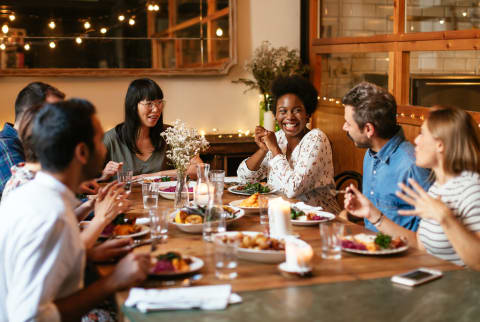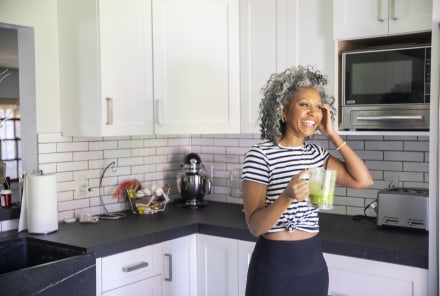Advertisement
Social Anxiety: What Causes It & How To Keep It In Check



Meeting new people or intermingling with big groups can be intimidating for many of us. But for some, the fear of interacting with others can significantly interfere with everyday life.
Social anxiety can cause people to dread—and even avoid—common activities such as birthday parties, office meetings, or even public places. To make matters worse, that fear of social situations can end up causing even more stress and anxiety.
Here's what you need to know about social anxiety and how to cope with it.
What is Social Anxiety Disorder?
Everyone experiences some level of social anxiousness at one time or another, but those with social anxiety disorder experience an above-average to severe level of worry, fear, and panic in social situations.
This disorder affects 40 million adults, or 18.1% of the U.S. population, according to the Anxiety and Depression Association of America.
"People with social anxiety disorder experience pervasive fears of social situations in which embarrassment or humiliation may occur," psychologist Justine Grosso, PsyD, PLLC, tells mbg. "However, they realize that the level of fear is excessive, which can cause individuals to fear being judged or rejected for appearing anxious, blushing, sweating, or coming across as incompetent or boring."
This may lead to avoidance of social situations or enduring them with intense distress.
Summary
What causes social anxiety?
As with most mental health disorders, social anxiety is caused by a combination of genetic and environmental factors. "A person's upbringing, social history, and other factors can certainly predispose a person to social anxiety," psychologist Carla Marie Manly, Ph.D., tells mbg. For example, social anxiety has been linked to experiences such as childhood bullying and family conflict.
According to Manly, most individuals develop social anxiety in mid-childhood. That said, social anxiety can worsen or improve over time and can flare up in adulthood.
"Although certain traumatic events can trigger a lifelong experience of social anxiety, it can also begin with just the internal dialogue of not being enough in comparison to others," psychologist Tony Ortega tells mbg. "This negative chatter may start as a murmur and grow into a roar over a period of time."
What tends to make social anxiety worse is avoidance. "[This could include] either avoiding situations that cause the anxiety or experiential avoidance: overuse of medications or other safety cues, which reduce the anxiety feelings short term but prevent new learning from taking place," psychologist Lara Fielding, Psy.D., Ed.M., tells mbg.
If you experience the symptoms of social anxiety, it's tempting to want to lock yourself inside and avoid anything that causes you discomfort.
But you don't have to let social anxiety get the best of you—there are a number of strategies you can do to help yourself become comfortable with social gatherings.
Summary
How can you manage social anxiety?
Like other types of anxiety, social anxiety is best addressed through psychotherapy, especially cognitive-behavioral therapy (CBT).
Some people are also able to manage their social anxiety through self-care that is focused on general anxiety reduction. "This often involves breathing, meditation, manageable, incremental exposure to anxiety-inducing situations, and timeouts as needed," says Manly.
Summary
What to do if you feel anxious before an upcoming event
Managing your anxiety is important, but the best thing anyone can do to reduce the suffering caused by social anxiety is to keep showing up. "Because every time you do, and you stay present through the anxiety, you learn you can handle it," says Fielding.
Ortega recommends making a list of social situations that cause anxiety, beginning with the least anxiety-producing to most anxiety-producing. "I would have the person tackle the least anxiety-producing [situations] first," he says. "This allows for psychological musculature to develop so they can later tackle the more anxiety-producing scenarios.
To avoid getting overwhelmed, you can incorporate certain strategies before, during, and after the event that will help you work through your anxiety and alleviate your fears over time.
Before the event:
Develop relaxation strategies
Coping skills such as deep breathing and progressive muscle relaxation help you engage the part of your nervous system that increases feelings of relaxation and calm. "Your breath controls your autonomic nervous system, so you want to get good at proper oxygenated breathing," says Fielding. "Pace your breathing so that your exhales are always longer than your inhales."
It can also help to develop your own self-validation mantra, which you can use with your paced breathing. "The repetition of a combination of words or phrases both interrupts the catastrophizing thoughts that will make your anxiety worse and also reminds you that you have some influence on things," says Fielding. "It might be something like, 'I'm inhaling awareness that anxiety is present; I'm exhaling with gratitude that I can handle this.' Just make sure you believe your mantra."
Learn and rehearse small talk
Before you leave the house, come up with some ideas of what you can talk to people about. "Make small talk about activities you have done recently or want to do in the future, books/movies, and whatever is going on around you," says Grosso. "Ask questions and respond to questions adding a little more information than the other person asked for."
Create an anti-anxiety care package
"This packet can include soothing mints, a calming essential oil such as lavender, positive mantra cards, and soothing hand lotion," says Manly. Those who find supplements helpful for reducing anxiety may also wish to add one to their anti-anxiety checklist.
"Magnesium citrate acts as a natural beta-blocker and can do wonders for public speaking anxiety," says Fielding. "CBD and other hemp products can provide some relief [for anxiety]1 as well to get you up and out."* Just be sure to check with your health care provider before adding any supplement to your regimen.
During the event:
Use grounding strategies
Mindful grounding strategies can help get you out of your head and into the present moment by feeling into the five senses of your body.
"This is important because if you are stuck in your head worrying the person you're talking to may not like you, you may miss seeing that they are smiling at you," says Grosso. "Mindful grounding strategies include feeling your feet in your shoes, feeling your sitz bones on the chair if sitting, holding and feeling the texture of an object (stone, shell, jewelry), or focusing on sounds."
Monitor your self-talk
"You want to avoid statements that are very absolute in nature such as, 'Everyone is going to know I am anxious,'" says Ortega. "Instead, name and honor the anxiety you are feeling, and choose to do something different about it."
You can challenge an unhelpful thought by looking at factual evidence for and against your thoughts and creating a new more balanced and helpful thought, whether it be positive or even just neutral.
Take timeouts
During the gathering, take timeouts as needed. You can go outside, take a walk, breathe, or have a mini-rest in the bathroom. "These timeouts allow you to recalibrate and break up the intensity of the anxiety you are feeling," says Ortega.
After the event:
Congratulate yourself on the positives
No matter how long or short a time you stayed, putting yourself out there when you have social anxiety is a success in itself.
"It is easy to focus on what feels unpleasant, so make sure to identify all of the things that went well in social interactions including the coping strategies you used and when people showed interest," says Grosso. "Make sure to celebrate what [went] well and try to focus on the process of facing your fears regardless of the outcome."
Focus on learning opportunities
"It can be helpful to review the past to identify what did not go well and create a plan for the future," says Grosso.
However, you want to avoid rumination loops (going over the past again and again when you have already found a plan for the future). If something sticks out as a "learning opportunity," focus on the fact that you're now more aware and prepared for the next social event.
Practice compassion
If you find yourself ruminating on past social interactions, feeling ashamed, or criticizing yourself, this is an opportunity to practice self-compassion. "Self-compassion consists of recognizing that you are feeling painful emotions, connecting with the fact that we all experience pain, and extending yourself kindness," says Gross. For example, telling yourself, "I'm so sorry this happened. May I feel safe and secure."
When should you see a professional about your social anxiety?
Most people experience some level of social anxiety from time to time, but if you feel highly anxious and worried about social events on an ongoing basis, it's likely your anxiety needs to be addressed.
"The difference between 'work stress' and other types of stressful environments, and social anxiety disorder is that in social anxiety, the fear, anxiety, or avoidance is persistent; the situations are either avoided or cause severe anxiety or panic attacks; and [the anxiety] typically lasts six or more months," says Field. "Also, in social anxiety, the individual is aware that their reaction is excessive.
If social anxiety is interfering with your everyday life, it's best to see a professional specializing in cognitive behavioral therapy (CBT) or one of the mindfulness-based CBTs.
Social interactions will always be a part of your life, and rather than avoid the activities that can also add joy to your life and reduce your anxieties, you'll want to tackle your fears head-on. But you don't have to do it alone. Lean on a supportive friend or therapist, and follow the above suggestions to help alleviate your social anxiety.


















